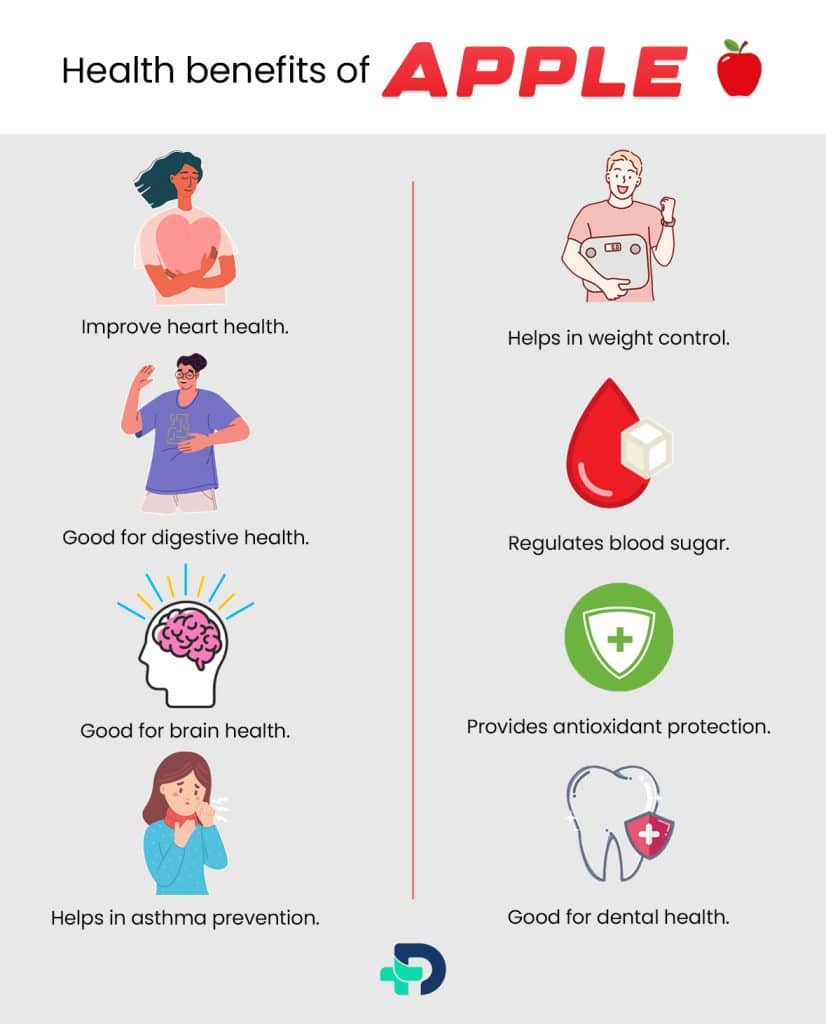Apple and its health benefits

- Apple
- 16 Aug 2023
Overview
About apple
Apples are the dearest and most broadly consumed organic products on the planet. With their new surface, reviving taste, and rich, healthful profile, apples have become a staple in many weight control plans and culinary customs.
They have captivated and delighted humans for centuries, appearing in everything from ancient myths and cultural symbolism to contemporary scientific research.2Overview| Researched based study from Nlm.nih.gov
This article dives into the intriguing universe of apples, investigating their assortments and wholesome advantages, and that’s just the beginning.
Types
What are the different types of apple ?
Apples are members of the Rosaceae family and the genus Malus in botany. The food’s genetic heritage, flavor, texture, and look are the main determinants of categorization.
Some popular types of apples are:
Red Delicious
- They are famous for their distinctive form and vivid red skin. They taste sweet with a little undertone of tartness.
Granny Smith
- Their striking green skin makes them easy to identify. They have an acidic, tart flavor that becomes milder as they develop. They taste tangy and refreshing and have a solid texture.
Gala
- The skin of these apples is yellow-orange with pink to crimson striped patterns. They taste crisp, fragrant, and sweet.
Honey crisp
- They are renowned for their crispness and well-balanced mix of sweet and sour tastes. They contain red and green skin.
Fuji
- They have skin that is primarily red or pink with some yellow-green spots. Their extraordinary sweetness and firm texture are well-known for them.
Golden delicious
- Their skin is a golden-yellow color with sporadic green spots. They taste balanced sweet, and sour.
Pink lady
- They have a characteristic pinkish-red skin tone and are named Cripps Pink.
McIntosh
- They have white flesh and brilliant crimson or red-green skin. They are recognized for having the perfect amount of sweetness and acidity.
Cripps Pink
- Often known as Pink Lady in the marketplace, it is well-known for its vivid pink skin and sweet-tart flavor.1Types| Researched based study from Nlm.nih.gov
Nutritional Value
Nutritional value of apples
In addition to being tasty, they are also loaded with vital vitamins and minerals that promote general health.
Vitamin C
- They are an excellent source of vitamin C, an antioxidant that supports collagen formation, the immune system, and iron absorption.4Nutritional value| Researched based study from Nlm.nih.gov
Vitamin A
- This vitamin, essential for maintaining good vision, boosting skin health, and strengthening immune function, is present in apples in comparable proportions.
Potassium
- Potassium, an electrolyte essential for maintaining fluid balance, neuronal function, and muscle contractions, is reasonably present in apples.
Dietary antioxidants
- They include a variety of antioxidants, including flavonoids and polyphenols, which support the body’s defenses against oxidative stress and lower the risk of chronic illnesses, including heart disease and some malignancies.
- They also offer small quantities of other minerals, such as calcium, magnesium, phosphorus, and tiny iron.4Nutritional Value| Researched based study from Nlm.nih.gov
Dietary fiber content
Soluble fiber
- They are an excellent source of soluble fiber, particularly pectin. Fibre promotes a sensation of fullness and lowers cholesterol, which controls blood sugar levels and may help with weight management.
Insoluble fiber
- This type of fiber encourages regular bowel movements, which adds weight to the stool and aids in preventing constipation.
Fiber content overall
- Depending on the size and species, apples’ total fiber content might vary, but on average, a medium-sized apple (weighing around 182 grams) has about 4 grams of dietary fiber. Since apple skin contains the bulk of the fruit’s fiber, eating the apple whole is advised to get the most fiber.4Nutritional Value| Researched based study from Nlm.nih.gov
Health benefits

Health benefits of apple
Improve heart health
- Heart disease risk has been related to regular apple eating. Apples’ high fiber and antioxidant content may help lower harmful cholesterol levels and lessen artery inflammation. They decrease the possibility of hypertension. According to several research, frequently eating apples may reduce your chance of having a stroke.9Health benefits| Researched based study from Nlm.nih.gov
Helps in weight control
- They make a substantial and satisfying snack since it is low in calories and fiber. The presence of fiber encourages feeling full, which lowers the risk of overeating.3Health benefits| Researched based study from Nlm.nih.gov
Good for digestive health
- Apples’ high fiber content can support a healthy digestive system. It can help reduce consumption and maintain regular bowel movements.
- Prebiotic substances in them nourish the good bacteria in the stomach. Apples can support a balanced gut microbiota, which is necessary for digestion and absorption, by feeding the beneficial bacteria.
- They include enzymes that can help break down fibers and sugars, such as amylase and pectinase. They also contain a lot of water, which helps keep you hydrated.2Health benefits| Researched based study from Nlm.nih.gov
Regulates blood sugar
- Reducing the rate at which sugar enters the bloodstream may help control blood sugar levels.
- Due to their low glycemic index, apples raise blood sugar levels gradually and moderately. This makes apples a fruit that diabetics or people trying to control their blood sugar levels should choose.3Health benefits| Researched based study from Nlm.nih.gov
Good for brain health
- According to research, eating apples may enhance cognitive performance and brain health.10Health benefits| Researched based study from Nlm.nih.gov
- Regular use may lead to enhanced learning and memory. They contain quercetin, which has been proven to promote acetylcholine synthesis, a neurotransmitter essential for cognitive function, suggesting that it may improve optimum brain function.
- Antioxidants may assist in preventing oxidative damage to brain tissue, lowering the risk of neurodegenerative diseases like Alzheimer’s.
- They are linked to increased cardiovascular health, which guarantees enough blood flow to the brain, which is necessary for the brain’s efficient functioning.3Health benefits| Researched based study from Nlm.nih.gov
Provides antioxidant protection
- They defend the body against oxidative stress and minimize the incidence of chronic illnesses like cancer.
Helps in asthma prevention
- They could lower the chance of developing asthma. It has been discovered that some apple compounds have anti-inflammatory effects on the airways.
Good for dental health
- Chewing apples increase saliva production, which helps wash away food particles and germs, lowering the risk of tooth decay and improving oral health.2Health benefits| Researched based study from Nlm.nih.gov
Side effects
Side effects and risk
May cause allergies
- Some people may have allergies or sensitivities to apples. Itching, swelling, hives, and digestive problems like nausea, diarrhea, and abdominal pain can all be symptoms. Apple seeds contain cyanide, which is considered as poisonous and should not be consumed.
May contain pesticide residue
- Pesticides are frequently used to treat apples that are produced conventionally to prevent diseases and pests. While the residual levels are often acceptable as long as they stay within defined limits, some individuals prefer to purchase organic ones to reduce pesticide exposure.8Side effects| Researched based study from Nlm.nih.gov
Cause dental health issues
- They have a moderately acidic nature. Thus, ingesting them excessively or regularly risks causing dental enamel erosion or sensitivity. After eating apples, it’s a good idea to rinse your mouth out with water and practice proper dental hygiene.
Not easy to digest
- They include FODMAPs, a class of carbohydrates that some individuals may find challenging to digest. People with irritable bowel syndrome or other digestive sensitivities may experience bloating, gas, or other uncomfortable symptoms.7Side effects| Researched based study from Nlm.nih.gov
Interactions
Interaction with medicines
The majority of drugs are not known to interact significantly with them. However, there are several things to bear in mind, like:
Blood thinning medications
- Apples have vitamin K, which is essential for blood clotting. Maintaining a steady diet of foods high in vitamin K, such as apples, is critical if you use blood thinners like warfarin to prevent any swings in this medication’s efficacy.5Interactions| Researched based study from Nlm.nih.gov
Antibiotics
- Tetracycline is one antibiotic that can bind to certain minerals present in foods, including apples. The binding may hinder the body’s ability to absorb the medicine. It is typically suggested to separate the eating of apples or other mineral-rich meals to guarantee adequate absorption.6Interactions| Researched based study from Nlm.nih.gov
Takeaway
Takeaway
Apples are one of the most popular and widely consumed fruits around the world with various health benefits. They are generally considered safe for many people and can be consumed every day in a moderate amount.
Any feedback on this article?
 This Articles content was accurate
This Articles content was accurate Very Informative Article
Very Informative Article I have a question or a comment
I have a question or a comment
 This article contains inaccurate content
This article contains inaccurate content This article was not helpful
This article was not helpful I have a question or a comment
I have a question or a comment
We appreciate your helpful feedback!
Checkout our social pages
References
-
National Library of Medicine
Traditional, Indigenous Apple Varieties, a Fruit with Potential for Beneficial Effects: Their Quality Traits and Bioactive Polyphenol Contents | Types
-
National Library of Medicine
A Comprehensive Review of Apples and Apple Components and Their Relationship to Human Health | Overview | Benefits
-
National Library of Medicine
Apple phytochemicals and their health benefits | Benefits
-
National Library of Medicine
Consumption of various forms of apples is associated with a better nutrient intake and improved nutrient adequacy in diets of children: National Health and Nutrition Examination Survey 2003–2010 | Nutritional value
-
National Library of Medicine
Interaction between Warfarin and Apple Juice | Interactions
-
National Library of Medicine
Interactions between Food and Drugs, and Nutritional Status in Renal Patients: A Narrative Review | Interactions
-
National Library of Medicine
Apple allergy: Causes and factors influencing fruits allergenic properties–Review | Side effects
-
National Library of Medicine
The effects of fruit bagging on residue behavior and dietary risk for four pesticides in apple | Side effects
-
National Library of Medicine
An apple a day keeps stroke away? Consumption of white fruits and vegetables is associated with lower risk of stroke | Benefits
-
National Library of Medicine
Apples | Benefits




































